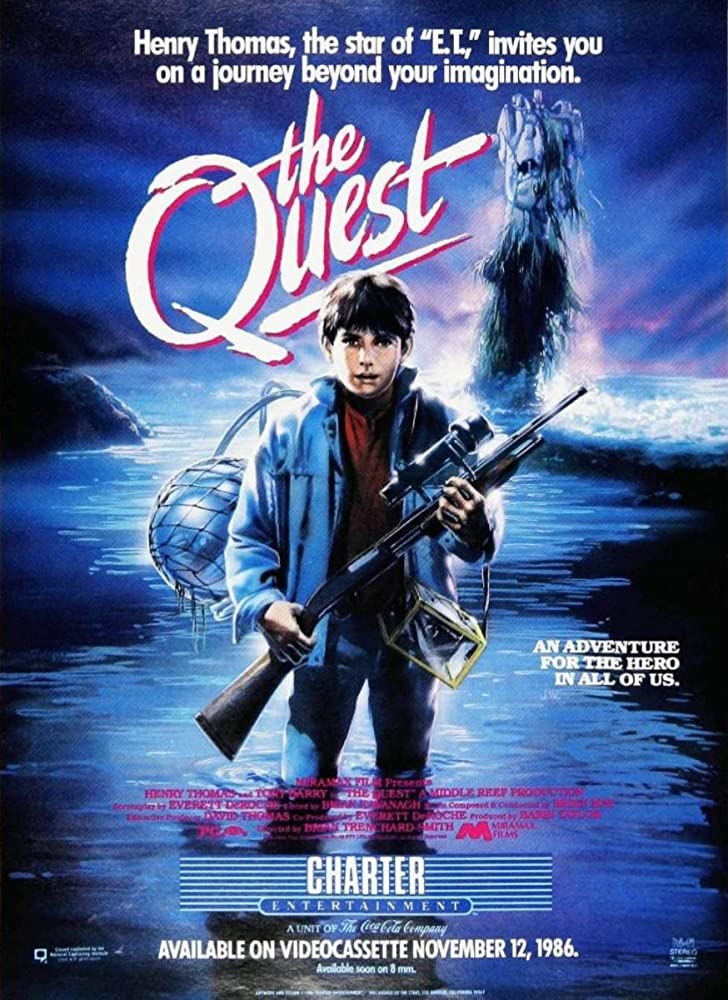

Frog Dreaming (Brian Trenchard-Smith, 1986) aka The Quest, Spirit Chaser; wr. Everett de Roche; Henry Thomas (from ET: The Extraterrestrial)
Paul Harris's short article in Murray (1995: 198) is mostly disparaging. He tells how Trenchard-Smith took over the direction two weeks in, when someone called Russell Hagg went off in a hissy fit. He mentions how permission had to be sought for Henry Thomas to come over and take the part away from a potential Australian actor (for obvious marketing reasons). And he runs down Everett de Roche's writing generally: he says the script 'frequently deploys American slang expressions' - funny, because I noticed the Aussie ones! - like 'shut your cake hole', for example. And Harris says that the shots of Australian wildlife are largely irrelevant, which is simply wrong: they contribute to the tension and the sense of the strangeness that BT-S is building up.
Raffaele Caputo in his review in Cinema Papers (58, Sept 1986: 50) is more perceptive than Harris. He points out three (or four) sources of unity in the film (the fourth one being the Aboriginal contribution). First, there is the quest, which he sees as being informed by Twain's Huckleberry Finn. Then there is the interest in mechanics and invention which runs through the whole thing, from the bike on rails to the donkey engine. Then there there is sexual awareness, which obtains much more in the world of the children than in the generally inadequate adults. Unfortunately, Caputo has much of his discussion of this last aspect depend on what I think is a mishearing - which I speculate is possibly because English is not his first language. He says Barry's character says Miller's character doesn't want Cody 'banging around' with his daughter. I'm pretty sure I heard Tony Barry say 'hanging around'. We didn't talk about sex as 'banging' in 1986; well, maybe Caputo did, but I'm sure it's not a word Tony Barry would ever use on film.
David Stratton in his book The Avocado Plantation (1990: 340-341) uses all of one of his two paragraphs knocking the 'opportunistic casting' of Henry Thomas, and his undisguised accent - which I think is a minor feature of the film, even if it's relevant at all.
None of these writers mention the thriller structure. Typically, Frog Dreaming has the initial scary teaser, followed by a very long buildup to the revelation of the monster - at 78-82 minutes into the 93 minute film. I noticed the timing, as I wondered what was in the coda. And again, typically, there is a final revelation: there really is kadaitcha, and frog dreaming, and a dreamtime - as seen, and stated, by Cody. However, the film withdraws from taking a definitive decision on this spiritual matter, by closing with the same shot with which it opened: the frog's-eye view which is ambiguously both above and below water-level.
A final word about the music: it's by Brian May (again) and sounds like routine 'film music' to me, which does nothing for this film, and could indeed be used for almost any film. But, given the 'dreaming' theme, there is some use of clicking sticks, and I think a bull-roarer at one point, but I don't remember hearing a didjeridu, thank goodness.
Caputo, Raffaele 1986, 'Childhood's end: Frog Dreaming', Cinema Papers, 59, Sept: 50.
Harris, Lauren Carroll, 'Frog Dreaming: a strange and wonderful should-be Australian classic', The Guardian, 27 July, online.
Harris, Paul 1995, in Scott Murray, Australian Film 1978-1994, OUP, 2nd ed.: 198.
Stratton, David 1990, The Avocado Plantation: Boom and Bust in the Australian Film Industry, Pan Macmillan, Sydney.
Garry Gillard | New: 16 September, 2012 - first film 'noted' on this site | Now: 11 November, 2022